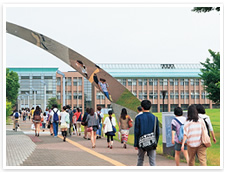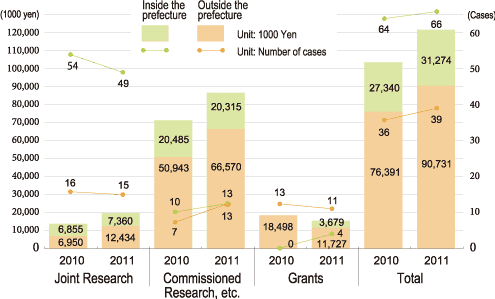- Striving to Become a University That is Relied Upon by the Local Community
- Endeavors to Contribute to the Region, Such as the Coordination of Industry,
Academia and Government, Research Activities, etc. - i-MOS Research Topics
- Summary of the Regional Policy Research Center’s Regional Cooperative Research Topics
(Faculty PropositionType)
 At Iwate Prefectural University, we are moving forward to realize our aspirations to become a university that contributes to the vitality of the region. We seek to achieve this goal mainly through the efforts of the Regional Cooperation Head Office.
At Iwate Prefectural University, we are moving forward to realize our aspirations to become a university that contributes to the vitality of the region. We seek to achieve this goal mainly through the efforts of the Regional Cooperation Head Office.
In the 2011 academic year, we cheifly focused on the promotion of Great East Japan Earthquake and Tsunami reconstruction research. Earthquake disaster reconstruction research conducted by the Regional Policy Research Center will continue in the 2012 academic year along with the development of a website and pamphlet to ensure that the work being done will become widely known.
The 36 topics selected by the open call regional topics research initiative in the 2010 academic year were continued in the 2011 academic year. In the 2012 academic year we made improvements to the research results verification process and system, and also established a new regional cooperation research initiative (faculty proposition type and local community proposition type).
As a university that is relied upon by the local community, we will furthermore continue to engage in activities that respond to the region’s needs, such as responding to the new demand to publically release research results as a condition to receiving academic research funds.
 In the 2011 academic year, there was an increase compared to the previous year in terms of the monetary amount and the total number of cases of joint research, commissioned research, and scholarship donations. The Wakate Younger Researchers Step-up Research Fund was established in 2011 to promote applications to Grants-in-Aid for Scientific Research. As a result, all 26 recipients applied to the Grants-in-Aid for Scientific Research, an 8.8% increase compared to the year before. In particular, efforts to raise research motivation in younger researchers were successful, as evidenced by the fact that graduate students in the Graduate School of Software and Information Science acquired 30 million yen of external funds, which was used for a research assistant system.
In the 2011 academic year, there was an increase compared to the previous year in terms of the monetary amount and the total number of cases of joint research, commissioned research, and scholarship donations. The Wakate Younger Researchers Step-up Research Fund was established in 2011 to promote applications to Grants-in-Aid for Scientific Research. As a result, all 26 recipients applied to the Grants-in-Aid for Scientific Research, an 8.8% increase compared to the year before. In particular, efforts to raise research motivation in younger researchers were successful, as evidenced by the fact that graduate students in the Graduate School of Software and Information Science acquired 30 million yen of external funds, which was used for a research assistant system.
Furthermore, we conducted 31 extension lectures at the Takizawa campus and Aiina – Iwate Citizen’s Information Exchange Center (located at the west entrance of Morioka Station) in order to spread research results to the citizens of Iwate. A total of 2,655 people attended the lectures. Furthermore, various departments held extension lectures and forums to report on earthquake reconstruction support activities and research.
|
|
The following 15 research topics were selected by the Iwate Monozukuri and Software Integration Technology Center (i-MOS) for the 2012 academic year.
| No. | Research Representative | Research Topic Name | Department |
|---|---|---|---|
| 1 | SAWAMOTO Jun | Research into weight reduction of brain computer interfaces (BCI) for personal use | Faculty of Software and Information Science |
| 2 | HASHIMOTO Koji | Research and development of total disaster management support systems for major disaster situations that use large scale high-definition high-resolution visualization devices | Faculty of Software and Information Science |
| 3 | DOI Akio | Research related to the optimization of custom fit template designs for bone fractures | Faculty of Software and Information Science |
| 4 | ABE Akihiro | Research of total support systems for regional tourism based on analytical visualizations of tourist activity | Faculty of Software and Information Science |
| 5 | INOMATA Toshimitsu | Development of automatic inspection systems to improve the quality of on-board (automobile) software | Faculty of Software and Information Science |
| 6 | ITO Kenzo | Research related to bone-conducted hearing systems to support automobile driving | Faculty of Software and Information Science |
| 7 | SASAKI Jun | Development of real-time information sharing systems to support visitation home care | Faculty of Software and Information Science |
| 8 | SATO Hiroyuki | Acceleration of satellite imagery data management through parallel distributed processing | Faculty of Software and Information Science |
| 9 | YAMADA Sachie | Development of hearing aid systems that emphasize the sense of direction of sound | Faculty of Social Welfare |
| 10 | OGAWA Akiko | Research of temporary housing security systems that use sensors | Faculty of Social Welfare |
| 11 | ARAI Yoshikazu | Driving support interfaces through low sample rate images | Faculty of Software and Information Science |
| 12 | SANO Yoshihiko | Research related to the improvement of temporary housing environments in coastal disaster stricken areas | Faculty of Policy Studies |
| 13 | SAI Dai | Research and development of low electrical energy consumption high-speed wireless communication methods and embedded system packaging technology | Faculty of Software and Information Science |
| 14 | Basabi Chakraborty | Research for improving the practicability of the P300 BCI speller using error-related potential | Faculty of Software and Information Science |
| 15 | Goutam Chakraborty | Development of text entry systems for the handicapped using viewpoint measurement | Faculty of Software and Information Science |
8 topics in earthquake disaster reconstruction research and 1 topic in general research were selected in the 2012 academic year as the regional cooperative research topics by the Regional Policy Research Center. Combined with the 15 topics chosen the year before, earthquake disaster research will continue to support the reconstruction of disaster stricken areas by exploring 5 topics in the lifestyle field, 7 topics in the industrial economy field, and 11 topics in the community and local infrastructure field.
| Research Classification |
Field of Research | Research Representative |
Research Topic | Department |
|---|---|---|---|---|
| Earthquake Disaster Reconstruction Research |
Lifestyle Field | OGAWA Akiko | Study of a medicine and welfare coordination plan using ICT centered around careful monitoring and observation | Faculty of Social Welfare |
| Industrial Economy Field |
SAI Dai | Research of automatic totalization of tourist activity using the “Kataribe Kun” portable terminal and promotion of regional economy | Faculty of Software and Information Science |
|
| Community and Local Infrastructure Field |
NAKAYA Takaharu | Research related to the mental wellness of residents from 2011 Tohoku earthquake and tsunami stricken areas – Fact finding surveys on the mental health of citizens post-disaster, using the analysis of health surveys from Kamaishi City – | Faculty of Social Welfare |
|
| Community and Local Infrastructure Field |
NISHIDE Junro | Establishment of systems and the creation of social entrepreneur cultivation opportunities through the support of young people | Faculty of Policy Studies |
|
| Community and Local Infrastructure Field |
MIURA Mayumi | Practical research related to the creation of living spaces for residents from disaster stricken areas by health support specialists, the nurses of the prefecture | Faculty of Nursing | |
| Community and Local Infrastructure Field |
TAKASHIMA Yuichi | Development of long-term monitoring surveys and analysis methods for qualitative information related to the earthquake disaster reconstruction conditions of Iwate | Faculty of Policy Studies |
|
| Community and Local Infrastructure Field |
MURAYAMA Yuko | Construction of a web-based tsunami archive to remember the tsunami | Faculty of Software and Information Science |
|
| Community and Local Infrastructure Field |
Basabi Chakraborty | Research aimed at social media to determine the needs of female earthquake victims | Faculty of Software and Information Science |
|
| General Research |
Environment, Resources and Life Science |
CHIBA Keiko | Research related to the nutritional functions of the Kurosengoku black soybean, a local product from Kitakami City, and its use in processed foods | Morioka Junior College |




